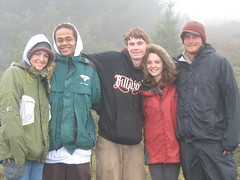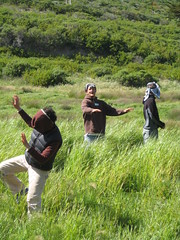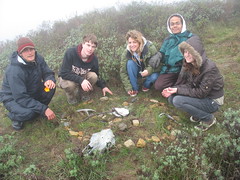—Jon Young, Ellen Haas, Evan McGowan, Coyote’s Guide to Connecting with Nature
Being the Change We Wish to See in the World
 We believe that when young people are opened to living as a part of nature and living purposefully, they act on inspiration and become leaders of change. Our vision is to help young people find firm roots themselves and deeply connect to the life around them.
We believe that when young people are opened to living as a part of nature and living purposefully, they act on inspiration and become leaders of change. Our vision is to help young people find firm roots themselves and deeply connect to the life around them.
The Regenerative Youth Project (RYP) is an 8-month journey for teens and young adults that explores our relationships to nature, self, and community, as well as the stories we tell ourselves about those connections. This closely mentored experience fosters an embodied and integral awareness of participants’ inner and outer worlds through immersive practices in nature awareness, creative expression, and the ecology of leadership.
RYP Curriculum
Using the inherent healing that comes with a restored connection to nature, the RYP helps foster empowerment and healthy human development. The core curriculum of RYP program includes three major areas of focus:
- Connection to Nature
- Connection to Self
- Connection to Community
Connection to Nature 
Of all the things we can do to create a healthier society, perhaps the easiest and most available step (even in the city) is to reintroduce children and teens—and adults too—to the natural world.
–Bill Plotkin, PhD, Nature and the Human Soul
RYP immerses you into the cycles that operate our natural world. Supported by the curriculum, you will grow and transform with the seasons: celebrating in the fall, losing leaves in the winter and sprouting new growth in the spring.
We facilitate structured and unstructured nature sits and wanders, allowing space for personal relations to form with place and nature’s rhythms. We provide visceral and technical experiences to increase your understanding of the natural world, so that you can begin to feel like an integral part of the ecosystem.
You’ll learn and practice:
- Earth living skills — shelter, water, fire, food
- Sensory awareness expansion and applications
- Awareness of hazards in nature
- Wild crafting — basketry, dreamcatchers, tools, medicine bags, natural pigments
- Journaling and researching
- Using curiosity as a mentoring tool
- Naturalist inventory skills
- Mammal track identification and natural history
- Tree and plant identification and natural history
- Basics of ecology, ecological indicators and keystone species
- Heritage species
- Bird identification and the basics of bird language
- Experiencing and exploring baseline behaviors, tracking and recognizing concentric rings
Connection to Self
Knowing others is intelligence, knowing oneself is true wisdom.
—Lao Tzu, Tao Te Ching
Culturally and individually, we explore our past through stories, studies, and ancestral tracking. Practicing awareness and observation of the present activities in your own and others’ lives will become tools to connect you to an opportunity of choice. A personal project is built into the program that allows you to create the story you wish to live in the future and outlines action points to get there.
These are some of the tools we’ll use:
- Inner tracking
- Designing your life/ ideal scenes
- One-on-one mentoring
- Facilitation and presentation skills
- Effective communication strategies
- Making and honoring commitments
- Project management
- Body awareness
- Peacemaking and non-violent communication
Connection to Community
For we who are alive at this time — whether we like it or not — are entering a rite of passage into the future. This rite is both personal and collective. We are no longer separate strands in the web of life, but the very weavers of the web that holds us all.
—Anodea Judith, Waking the Global Heart
 If you travel together for 8 months, you naturally create the bond of a community. To encourage this, we use many community-building tools during the program ranging from facilitation and meeting protocol to ceremony. Agreeing on a healthy foundation — with compassion and peacemaking as two strong pillars supporting us — we can lead our communities back into alignment with the natural environment.
If you travel together for 8 months, you naturally create the bond of a community. To encourage this, we use many community-building tools during the program ranging from facilitation and meeting protocol to ceremony. Agreeing on a healthy foundation — with compassion and peacemaking as two strong pillars supporting us — we can lead our communities back into alignment with the natural environment.
Through the RYP program, we want to empower each of you with tools necessary to make a substantial contribution to your community. We will review and practice cultural organization models, observe cosmologies and creation stories to gain perspective on our own, and describe aspects of a healthy and balanced community.
Some of the community building skills you’ll develop include:
- Peacemaker principles
- Art of mentoring
- Art of questioning
- Observation
- Storytelling
- Mapping
- Applied cultural technology
- Ceremony
- Creative arts and improvisation
- Design
- Permaculture principles